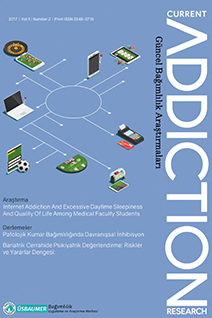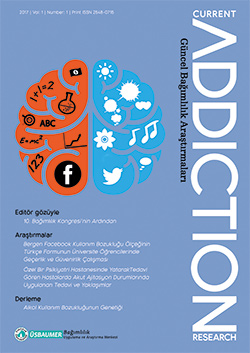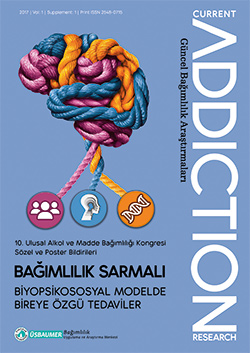Years
2024
Categories
Authors
ARTICLES
Review Article
Substance Addiction In Adolescents And The Role Of The Family: A Mini Review
ÖZKAN EZGİ,KARABURUN MERVE,KABA AYŞE,DURMUŞ ELİF,EMLU HAKAN,KABA FATİH,FİDAN ENİSE KÜBRA
2024, 8(2), s:5-9
Substance addiction is one of the important problems threatening society today. Although it causes negative consequences in the person's life, it makes the process more dangerous as the person develops tolerance and desires the substance more. Adolescence is considered a risky period in substance addiction, where psychological, sociocultural and genetic factors play a role, and many factors such as the biological, psychological and environmental conditions of the adolescent determine the development processes of substance addiction. At this point, the family plays a role in the child's social and cognitive development and is seen as an important factor in the process of developing substance addiction. Lack of family functionality can lead to aggression and anti-social behavior disorder, and as a result, delinquency and substance use behaviors may occur in the adolescent. In this study, the role of the family in adolescents' development of substance addiction will be discussed.
Original Article
Strengthening the Awareness Levels of University Students Regarding Substance Use
AYŞEGÜL DUMAN,HİLAL ÇERKEZOĞLU,SALİH GÜLEN
2024, 8(2), s:10-13
The widespread use of substances in society requires various precautions to be taken and our youth to be made aware of this issue. It is important to educate young people (18-25 age group) who start university on these issues and to determine their substance use awareness levels and train them if necessary. For these reasons, the aim of the research is to strengthen the substance use awareness levels of university students. In this context, the research, which was conducted with a pre-posttest experimental and control group experimental design, lasted six weeks. The data collected using the Determination of Awareness Levels of University Students Towards Substance Use Scale was analyzed by applying T-test with the help of SPSS package program. According to the obtained data; it can be said that the “Addiction Awareness Program” implemented to strengthen the awareness levels of university students towards substance use produced positive results on the experimental group. It is recommended that programs that strengthen substance abuse awareness, such as addiction awareness programs, be provided to young people.
Original Article
Bibliometric Analysis of Theses Conducted about Alcohol Use Disorder in Turkey
HATİCE OKSAL,ÖMER BÜBER,HANDE TUĞÇE DEMİRCİ
2024, 8(2), s:14-22
Objective: Alcohol use disorder is a common public health issue that negatively affects an individual's quality of life, as well as their physical, psychological, and social well-being. The aim of the study was to conduct a bibliometric analysis of postgraduate studies on alcohol use disorder in Turkey between the years 2008-2024. Method: This study is a descriptive scanning research conducted using bibliometric analysis methods. Searches were conducted separately in the National Thesis Center database using the keywords "alcohol use disorder," "alcohol dependence," "alcoholism," and "alcohol abuse." The inclusion criteria were determined as the theses being open access and including human samples. Based on these criteria, a total of 200 theses constituted the sample for the analysis. Findings: In the study, it was determined that the theses on alcohol use disorder were mostly master's level, quantitative and cross-sectional. It was determined that the highest number of theses were published in Ege University, and the departments that studied the subject the most were psychiatry, psychology and nursing. The most frequently used scale in the theses was found to be the Michigan Alcohol Screening Scale. Conclusion: The data obtained are largely in line with the studies in the literature. Using longitudinal and qualitative methods together in theses can provide more detailed information about alcohol use disorder. In future research, it may be useful for different disciplines to work together in order to provide innovative solutions to problems.
Review Article
A holistic review of fentanyl use and its impact on public health
ALEJANDRO BORREGO-RUIZ
2024, 8(2), s:23-33
Fentanyl is a synthetic opioid that was engineered to provide a potent analgesic effect, with its medical utility widely established in clinical contexts such as pain management and anesthesia. Fentanyl use has become a critical public health issue due to diversion for misuse and to rapidly proliferation of illicit manufacturing. This persistent increase in illicitly manufactured fentanyl distribution shows no indication of decline, raising significant concerns regarding its impact on public health and opioid misuse trends, including a dramatic increase in overdose deaths. Moreover, individuals from socially or economically precarious backgrounds, as well as those suffering from mental health disorders, are particularly vulnerable, as limited access to resources and support systems can lead to increased substance use as a coping mechanism for stress and adversity. Therefore, the objective of this narrative review is to provide a holistic overview on fentanyl, addressing its synthesis process, pharmacology and clinical use, relationship with gut microbiome, epidemiology and global distribution, patterns of use and motivations, and overdose treatment. For this purpose, current and relevant evidence on fentanyl and its correlates has been conscientiously assessed and outlined.



 2. Sayı
2. Sayı
 1. Sayı
1. Sayı
 Ek Sayı
Ek Sayı







